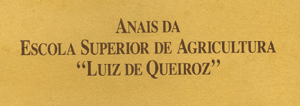Resumos
Plantas jovens de Coffea arabica L., var. Mundo Nôvo foram cultivadas em solução nutritiva, sob o efeito de diferentes variações de pH (4,0 a 7,5) do substrato, a fim de se constatar o desenvolvimento e composição mineral. A melhor faixa de pH para o crescimento em altura, número de fôlhas, pêso da matéria fresca e sêca é de 4,0 a 6,0. A quantidade total de todos os macronutrientes absorvidos pelo cafeeiro diminui à medida que o pH se eleva.
Young coffee trees were grown in nutrient solution at different pH values, from pH 4,0 to pH 7,5 at 0,5 pH units of interval. After 140 days the plants were harvested and the main conclusions are the following: 1. The best range of pH for high, number of leaves fresh and dry weight of the plants were: pH 4,0 to pH 6,0. 2. There were a decrease in dry weight percentage of the leaves eith increase of the pH solution. 3. With the increase of the pH there was a decrease in macronutrients content in the plants. 4. At higher levels of pH there was a percentual decrease in N, P, Ca and S in the leaves. At pH 4,0 did not effect K content, bu there was a slight decrease in Mg content. 5. There was a linear relation between pH and the K+Ca+Mg/N+P+S ratio.
Estudos sôbre a alimentação mineral do cafeeiro. XX. Efeito da variação de pH no desenvolvimento e composição química do cafeeiro (Coffea arabica L., var. Mundo Nôvo) cultivado em solução nutritiva* * Trabalho subvencionado pelo Instituto Brasileiro do Café.
H.V. de AmorimI; L.C. ScotonII; H.P. HaagI; E. MalavoltaI
IDepartamento de Química - E.S.A. "Luiz de Queiroz"
IIBolsista em 1965 da Fundação de Amparo à Pesquisa do Est. de São Paulo, na Cadeira de Matem. e Estat. da ESALQ
RESUMO
Plantas jovens de Coffea arabica L., var. Mundo Nôvo foram cultivadas em solução nutritiva, sob o efeito de diferentes variações de pH (4,0 a 7,5) do substrato, a fim de se constatar o desenvolvimento e composição mineral.
A melhor faixa de pH para o crescimento em altura, número de fôlhas, pêso da matéria fresca e sêca é de 4,0 a 6,0.
A quantidade total de todos os macronutrientes absorvidos pelo cafeeiro diminui à medida que o pH se eleva.
SUMMARY
Young coffee trees were grown in nutrient solution at different pH values, from pH 4,0 to pH 7,5 at 0,5 pH units of interval.
After 140 days the plants were harvested and the main conclusions are the following:
1. The best range of pH for high, number of leaves fresh and dry weight of the plants were: pH 4,0 to pH 6,0.
2. There were a decrease in dry weight percentage of the leaves eith increase of the pH solution.
3. With the increase of the pH there was a decrease in macronutrients content in the plants.
4. At higher levels of pH there was a percentual decrease in N, P, Ca and S in the leaves. At pH 4,0 did not effect K content, bu there was a slight decrease in Mg content.
5. There was a linear relation between pH and the K+Ca+Mg/N+P+S ratio.
Texto completo disponível apenas em PDF.
Full text available only in PDF format.
LITERATURA CITADA
Entregue para publicação em 21/10/1968.
- AMORIM, H.V. de, L.C. SCOTON, H.P. HAAG & E. MALAVOLTA, 1964. Efeitos de diferentes níveis de N, P e K sobre cacaueiros jovens (Theobroma cacao L.) em solução nutritiva. Anais da E.S.A. "Luiz de Queiroz", XXV (no prelo).
- ARNON, D.I., W.E. FRATZKE & L.M. JOHNSON, 1942. Hidrogen ion concentration on growth of higher plants under by higher plants. Plant Physiology 17: 525-539.
- CAMARGO, T. de, R. BOLLIGER & P.C. de MELLO, 1937. Fisiologia Vegetal. Sobre a influência da concentração em ions hidrogênio do meio de cultura sobre o desenvolvimento do cafeeiro (Coffea arabica L.). Instituto Agronômico de Campinas, Boletim Técnico nş 3, Campinas, S.P.
- CARVAJAL, J.F., C.A. LOPES & A. ACEVEDO, 1963. Efecto del pH del substrato en el crecimiento y absorción del café. Rev. Biol. Trop. 11: 141-155.
- DORSDOFF, M. & D.C. NEARPASS, 1948. Quantitative microdetermination of magnesium in plant tissue and soil extracts. Analitical Chemistry 20: 673-674.
- HAAG, H.P. & E. MALAVOLTA, 1960. Estudos sobre a alimentação mineral do cafeeiro. III. Efeito das deficiencias dos macronutrientes no crescimento e na composição química do cafeeiro (Coffea arabica L.) var. bourbon (B. Rodr.) Choussy cultivado em solução nutritiva. Revista da Agricultura 35: 273-289.
- HAGEN, C.E. & H.T. HOPKINS, 1955. Ionic species in orthophosphate absorption by barley roots, Plant Physiology 30: 193-199.
- HOAGLAND, D.R. & D.I. ARNON, 1950. The water culture method for growing plants without soil. Calif. Agr., Exp., Sta. Berkeley, Calif., Cir. 347.
- HONERT, T.H. Van Den, J.J.M. HOOYMANS, 1955. Experiments on the relation between water absorption and mineral uptake by by plant roots. Acta Bot. Neerl. 4:139-155.
- LOTT, W.L., J.P. NERY, J.R. GALLO & J.C. MEDCALF, 1956. A técnica de análise foliar aplicada ao cafeeiro. Instituto Agronômico de Campinas, Boletim nş 79, Campinas. S.P.
- LOUÉ, A., 1961. Estudo das carências e deficiências minerais do cacau. Fertilité nş 14: 5-41.
- MALAVOLTA, E., 1957. Práticas de Química Orgânica e Biológica. Centro Acadêmico "Luiz de Queiroz", Piracicaba. S.P.
- MALAVOLTA, E. & T. COURY, 1954. Apostila de Prática de Química Agrícola, Centro Acadêmico "Luiz de Queiroz", Piracicaba S.P.
- SUTCLIFFE, J.F., 1962. Mineral salts absorption in plants. Pergamen Press, New York, USA.
- TOTH, S.J., A.L. PRINCE, A. WALLACE & D.S. IKKELSEN, 1948. Rapid quantitative determination of light mineral elements in plant tissue by a systematic procedure involving use of a flame photometer, Soil Science 66:459-466.
Datas de Publicação
-
Publicação nesta coleção
11 Jun 2012 -
Data do Fascículo
1968

